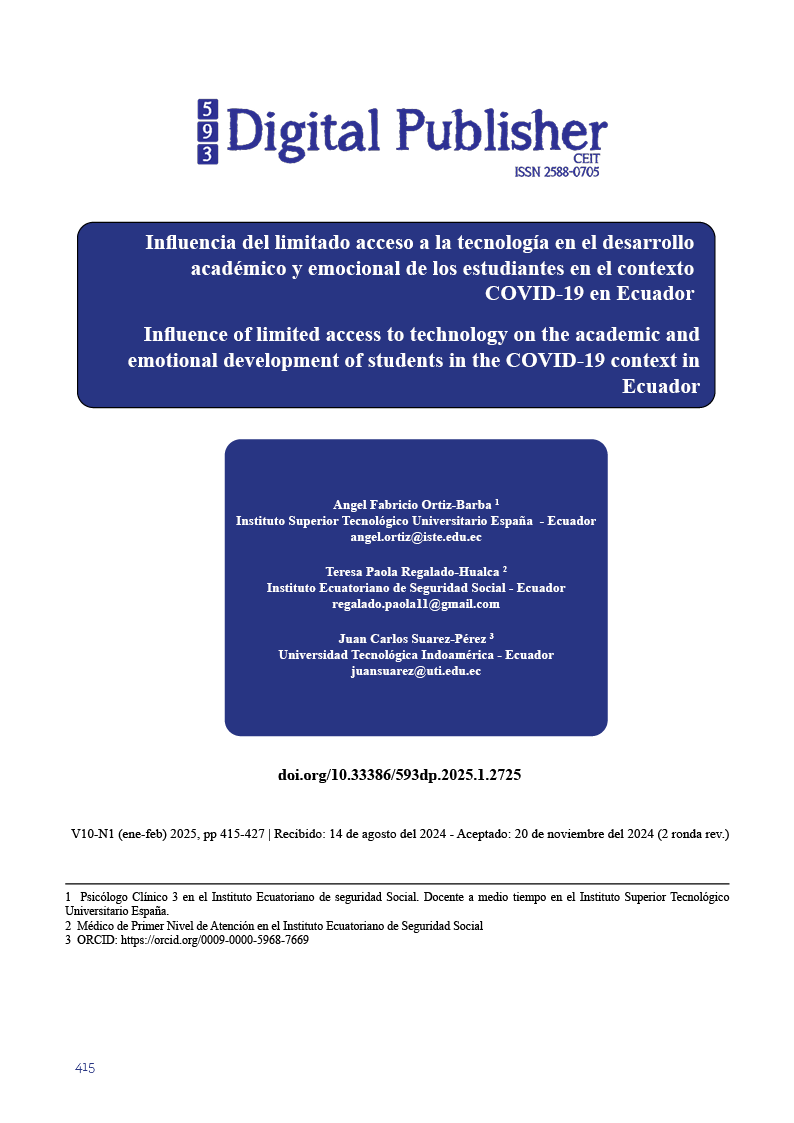Influence of limited access to technology on the academic and emotional development of students in the COVID-19 context in Ecuador
Main Article Content
Abstract
The COVID-19 pandemic had a significant impact on education and mental health in young people around the world; evidencing that one of the main barriers faced by students in this context is the limited access to technology, which had a negative impact on academic and emotional development. The objective of the research is to determine the influence of limited access to technology on the academic and emotional development of students during the COVID-19 pandemic. The methodology employed is a literature review supported by Gowin's V method, which included the search of scientific articles in several databases such as Scopus, Latindex, WoS, among others, and the selection of those that met the inclusion criteria. The results revealed that the limited access to technological tools hindered young people's learning, and they also had difficulties in maintaining contact with others, both situations led to educational lag and affected emotional well-being, increasing levels of anxiety, stress and social isolation. It was found that those who have limited access to technology have greater difficulties in participating in classes and completing their homework, which has a negative impact on academic performance and self-esteem. Likewise, the lack of social interaction, which is usually vital in the development of young people, was minimal, which exacerbated the problems already mentioned. In conclusion, the lack of technological tools negatively affected the academic and emotional development of students during the COVID-19 pandemic and even today. Therefore, it is imperative to take measures to ensure access to technology and the necessary resources to learn and develop in an ideal environment, in which students have the opportunity to develop their academic and emotional potential, even in difficult times such as those experienced today.
Downloads
Article Details

This work is licensed under a Creative Commons Attribution-NonCommercial-ShareAlike 4.0 International License.
1. Derechos de autor
Las obras que se publican en 593 Digital Publisher CEIT están sujetas a los siguientes términos:
1.1. 593 Digital Publisher CEIT, conserva los derechos patrimoniales (copyright) de las obras publicadas, favorece y permite la reutilización de las mismas bajo la licencia Licencia Creative Commons 4.0 de Reconocimiento-NoComercial-CompartirIgual 4.0, por lo cual se pueden copiar, usar, difundir, transmitir y exponer públicamente, siempre que:
1.1.a. Se cite la autoría y fuente original de su publicación (revista, editorial, URL).
1.1.b. No se usen para fines comerciales u onerosos.
1.1.c. Se mencione la existencia y especificaciones de esta licencia de uso.
References
Hernández, A. (2020). Acceso, usos y problemas en la educación virtual: una aproximación a las experiencias de estudiantes y docentes durante la cuarentena obligatoria en Argentina. Pacha. Revista de Estudios Contemporáneos del Sur Global, 1(1), 68-75. doi:https://doi.org/10.46652/pacha.v1i1.5
Banco Mundial. (2020). COVID-19: Impacto en la educación y respuesta de Política Pública. Obtenido de https://thedocs.worldbank.org/en/doc/143771590756983343-0090022020/original/Covid19EducationSummaryesp.pdf
Berenzon-Gorn, S., Saavedra-Solano, N., & Galván-Reyes, J. (2018). Contextos y desafíos para la atención de la salud mental en el primer nivel. Una aproximación socioecológica. Salud Pública de México, 60(2). Obtenido de https://www.scielo.org.mx/scielo.php?script=sci_arttext&pid=S0036-36342018000200021
Cabero, J., & Valencia, R. (2020). Y el COVID-19 transformó al sistema educativo: reflexiones y experiencias por aprender. International Journal of Educational Research and Innovation (IJERI), 15, 218-228. Obtenido de https://upo.es/revistas/index.php/IJERI/article/view/5246/4640
Comisión Económica para América Latina y el Caribe. (2020). La educación en tiempos de la pandemia de COVID-19. Santiago: CEPAL. Obtenido de https://repositorio.cepal.org/bitstream/handle/11362/45904/S2000510_es.pdf?sequence=1&isAllowed=y
Diaz , J., Ledesma, M., Tito , J., & Diaz, L. (2022). Calidad educativa y consideraciones filosóficas en un contexto de pandemia COVID-19. Revista Venezolana de Gerencia, 27(7), 328-346. Obtenido de https://dialnet.unirioja.es/servlet/articulo?codigo=8890682
Expósito, C., & Marsollier, R. (2020). Virtualidad y educación en tiempos de COVID-19. Un estudio empírico en Argentina. Educación y Humanismo, 22(39), 1-22. Obtenido de https://ri.conicet.gov.ar/bitstream/handle/11336/119010/CONICET_Digital_Nro.1b1556b0-523b-4761-bfb3-5b4d9d93ae19_A.pdf?sequence=2&isAllowed=y
Farro , C., Vallejos, J., & Bautista, S. (2020). La brecha digital: una barrera limitante para el desarrollo educativo. Revista Conrado, 16(1), 223-229. Obtenido de https://conrado.ucf.edu.cu/index.php/conrado/article/view/1544/1528
García, N., Rivero, M., & Guerra, J. (2020). Brecha digital en tiempo del COVID-19. Aportaciones Arbitradas – Revista Educativa Hekademos(28), 76-85. Obtenido de https://dialnet.unirioja.es/servlet/articulo?codigo=7602854
Hernández, A. (2020). Gestión de las emociones en tiempos de pandemia y su impacto en el rendimiento académico. UCV HACER Revista de Investigación y Cultura -Universidad César Vallejo, 9(4), 55-64. Obtenido de http://revistas.ucv.edu.pe/index.php/ucv-hacer/article/view/586/575
Herrera, E., & Sanchez, I. (2019). Uso de la Uve de Gowin en el diseño de prácticas de laboratorio en Física. Espacios, 40(23). Obtenido de https://www.revistaespacios.com/a19v40n23/19402321.html#:~:text=El%20diagrama%20Uve%20de%20Gowin%2C%20es%20un%20m%C3%A9todo%20heur%C3%ADstico%20que,hacer%20o%20procedimental%20(derecho).
Instituto Nacional de Estadística y Censos. (2021). Tecnologías de la Información y Comunicación. Quito: INEC.
Kuric, S., Calderón, D., & Sanmartín, A. (2021). Educación y brecha digital en tiempos del COVID-19. Perfiles y problemáticas experimentadas por el alumnado juvenil para afrontar sus estudios durante el confinamiento. Revista de Sociología de la Educación (RASE), 14(1), 63-84. doi:doi: http://dx.doi.org/10.7203/RASE.14.1.18265
Martín, M., Santo, D., & Río, C. (2020). Factores personales-institucionales que impactan el rendimiento académico en un posgrado en educación. CPU-e. Revista de Investigación Educativa(27). Obtenido de https://www.scielo.org.mx/scielo.php?script=sci_arttext&pid=S1870-53082018000200004
Meneses, N. (2021). Desafíos de la salud mental y oportunidades de futuro para la psicología. El País. Obtenido de https://elpais.com/economia/formacion/2021-10-28/desafios-de-la-salud-mental-y-oportunidades-de-futuro-para-la-psicologia.html
Ministerio de Educación. (2022). Resultados de las encuestas de monitoreo del impacto de la pandemia de COVID-19 en la comunidad educativa ecuatoriana. Fondo de las Naciones Unidas para la Infancia - UNICEF. Obtenido de https://www.unicef.org/ecuador/media/10156/file/Ecuador_encuestas_covid_educacion.pdf

Ordorika, I. (2020). Pandemia y educación superior. Revista de la educación superior, 49(194). doi:https://doi.org/10.36857/resu.2020.194.1120
Organización Mundial de la Salud. (2022). Salud mental y COVID-19: datos iniciales sobre las repercusiones de la pandemia. Obtenido de https://www.who.int/es/publications/i/item/WHO-2019-nCoV-Sci_Brief-Mental_health-2022.1
Pacheco, G., Maldonado, B., & Ferrer, R. (2018). Los problemas sociales y el impacto en el desempeño académico: Estudio de caso de estudiantes en lengua inglesa. Revista Boletín REDIPE, 7(12).
Palma, G., & Barcia, M. (2020). El estado emocional en el rendimiento académico de los estudiantes en Portoviejo, Ecuador. Dominio de las Ciencias, 72-100. Obtenido de https://dx.doi.org/10.23857/dc.v6i3.1207
Pan American Journal of Public Health. (2020). Emerging mental health challenges, strategies, and opportunities in the context of the COVID-19 pandemic: Perspectives from South American decision-makers. Rev Panam Salud Publica, 44(154). Obtenido de https://doi.org/10.26633/RPSP.2020.154
Ramos, C., Jadán, J., Paredes, L., Bolaños, M., & Gómez, A. (2017). Procrastinación, adicción al internet y rendimiento académico de estudiantes universitarios ecuatorianos. Estudios pedagógicos (Valdivia), 43(3). doi:http://dx.doi.org/10.4067/S0718-07052017000300016
Sánchez, L., Sánchez, J., Palomino, G., & Verges, I. (2021). Desafíos de la educación universitaria ante la virtualidad en tiempos de la pandemia. Revista de Ciencias Sociales (RCS), 27(4), 32-48. Obtenido de https://produccioncientificaluz.org/index.php/rcs/index
Sánchez, M., Martínez, A., Torres, R., de Agüero, M., Hernández, A., Benavides, M., . . . Jaimes, C. (2020). Retos educativos durante la pandemia de COVID-19: una encuesta a profesores de la UNAM. Revista Digital Universitaria, 21(3), 1-25. doi: http://doi.org/10.22201/codeic.16076079e.2020.v21n3.a12
Sandoval, C. (2020). La Educación en Tiempo del Covid-19 Herramientas TIC: El Nuevo Rol Docente en el Fortalecimiento del Proceso Enseñanza Aprendizaje de las Prácticas Educativa Innovadoras. Revista Tecnológica-Educativa Docentes 2.0, 9(2), 24-31. Obtenido de https://ojs.docentes20.com/index.php/revista-docentes20/article/view/138/366
Tirado, B. (2020). La saludmental de los niños y adolescentesen tiempos de pandemia. Rev Hisp Cienc Salud, 6(4), 161-165. Obtenido de https://www.uhsalud.com/index.php/revhispano/article/view/445/276
Tobón, S., Gonzalez, L., Nambo, J., & Vazquez, J. (2015). La Socioformación: Un Estudio Conceptual. Paradigma, 36(1), 7 – 29. Obtenido de http://ve.scielo.org/pdf/pdg/v36n1/art02.pdf
UNESCO. (2021). Educación Pospandemia: Salud mental y prevención de la violencia con la comunidad educativa. Obtenido de https://es.unesco.org/sites/default/files/doc-memoria-foro-educacion-post-pandemia.pdf
Urquizo, D. (2021). COVID-19 y tele psiquiatría: un reto para el manejo en salud mental, revisión bibliográfica. Universidad Central del Ecuador. Obtenido de http://www.dspace.uce.edu.ec/bitstream/25000/25605/1/UCE-FCM-CPO-URQUIZO%20DAMARIS.pdf
Vázquez, S., & García, A. (2022). La educación digital en los tiempos del COVID-19: La digitalización forzosa. Teknokultura. Revista de Cultura Digital y Movimientos Sociales, 19(2), 119-121.
Velásquez, B. (2020). La Educación Virtual en tiempos de Covid-19. Revista Científica Internacional, 3(1), 19-25. Obtenido de https://revista-cientifica-internacional.org/index.php/revista/article/view/8/35
Vivanco, A. (2020). Sólo el 16,1% de los hogares tiene conectividad brechas de desigualdad. CienciAmérica, 9(2), 1-10. Obtenido de https://www.cienciamerica.edu.ec/index.php/uti/article/view/307/518
Vivanco, A. (2020). Teleducación en tiempos de COVID-19: brechas de desigualdad. CienciAmérica, 9(2). Obtenido de https://www.cienciamerica.edu.ec/index.php/uti/article/view/307/518




